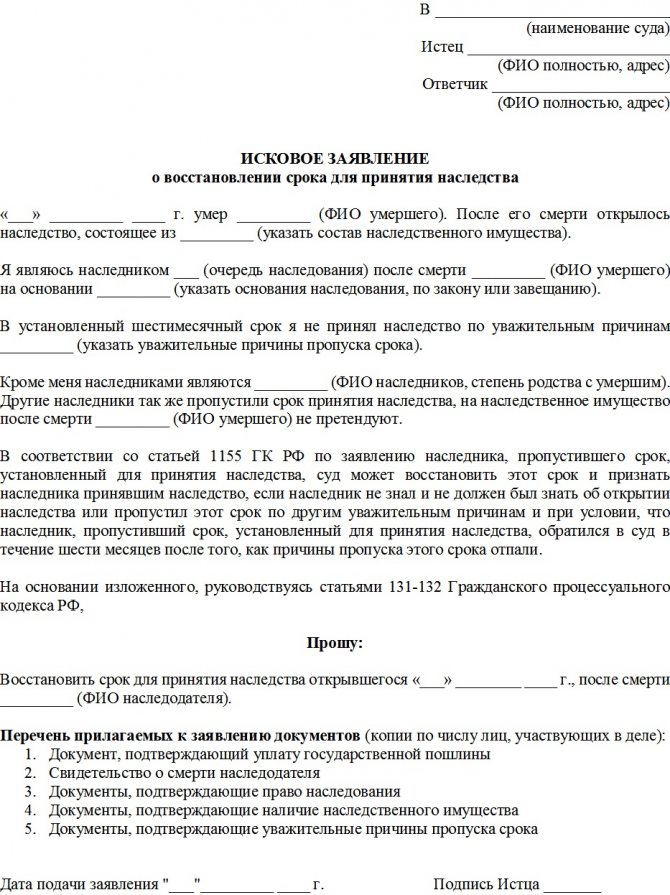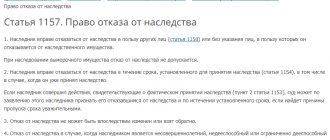Legislation provides for a period of 6 months to contact a notary and enter into inheritance. This period is prescribed in Art. 1154 of the Civil Code of the Russian Federation. Its countdown begins from the moment when the inheritance case is opened. This period should be sufficient to make a final decision on whether to accept the bequeathed property or to refuse it. You need to collect the necessary documents in six months.
Dear readers! The article talks about typical ways to resolve legal issues, but each case is individual. If you want to find out how to solve your particular problem , contact a consultant:
+7 (499) 110-56-12 (Moscow)
+7 (812) 317-50-97 (Saint Petersburg)
8 (800) 222-69-48 (Regions)
APPLICATIONS AND CALLS ARE ACCEPTED 24/7 and 7 days a week.
It's fast and FREE !
The legislative framework
The statute of limitations begins when a citizen learns that he is entitled to an inheritance or should have known about it. The period is 3 years. If the heir did not know about the inheritance matter at that time, this does not mean that his right to the testator’s property is lost. Regardless of the period of application, the heir who has valid reasons for his absence has the right to a part of the inheritance. The reasons for his absence must be documented.
In the Code of Civil Procedure Art. 196 introduced an amendment to the statute of limitations, according to which the limitation period is limited to 10 years.
Limitation period for cases of deprivation of shares
Article 1117 of the Civil Code of the Russian Federation defines the circle of legal successors who may be deprived of the right to inheritance (recognized as unworthy heirs). These include persons who:
- committed illegal actions in relation to the testator, heirs or against the will of the deceased;
- contributed to an increase in the share or calling to inheritance of oneself or others;
- maliciously evaded their responsibilities to support the testator.
Unworthy heirs cannot claim rights to the property of the deceased, but they can appeal the court decision.
The period of claim in cases of deprivation of a share is general and is 3 years. Facebook
Concept and purpose
The transfer of rights to the property of the deceased is carried out on the basis of his will or by law if there is no will. The law prescribes a specific algorithm for the distribution of inheritance by kinship.
According to the law, relatives have the right to inherit property; they are divided by law into categories according to the degree of relationship in relation to the testator. According to the will, anyone can receive the inheritance.
There is a special category of citizens who receive a mandatory share of the inheritance upon acceptance, regardless of whether they are mentioned in the will or not. We are talking about the children of the deceased: marital, illegitimate, recognized and unrecognized (if the fact of paternity is documented). The transfer of property is carried out by a notary between the participants in the notarial case who have officially declared themselves.
After the death of the testator, relatives claiming property rights write applications to be recognized as heirs. Within 6 months, the notary reviews the inheritance case, if necessary, requesting additional documents confirming the family relationship with the deceased.
The concept of the statute of limitations for receiving an inheritance
Having a will matters. If one is drawn up, the entry procedure involves re-registration of documents. Otherwise, the statute of limitations for inheritance cases comes into force. This is the period during which the applicant is obliged to declare his intentions, confirm the presence of family ties, and prove that he is a bona fide successor.
It must be taken into account that, according to the statute of limitations, entry into an inheritance after the death of the owner of the property is possible six months later. This rule is spelled out in laws, in particular in the Civil Code of the Russian Federation. The distribution of the degree of right to claim property is based on family ties, which are divided into categories in the laws. Entry is possible if there is a legal basis to be considered a relative and a will has not been drawn up for the property of the deceased.
In addition to the statute of limitations, entering into an inheritance, according to the law, involves the allocation of mandatory shares. This right is given to the children of the deceased. This could be a child:
- born in wedlock;
- born out of wedlock;
- recognized and unrecognized.
And even if we are talking about entering into an inheritance after the statute of limitations, the offspring have the right to use part of the property of the deceased. And values are transferred on the basis of notarized documents. To initiate the process, a corresponding application is submitted.
During what period can property be accepted by law and by will?
After the applicants have submitted applications to take possession of the property of the deceased, the notary begins the inheritance case. Its essence is to legally distribute property between heirs. To do this, for 6 months the notary examines the documents provided and examines whether there are any applicants who have not declared themselves. If the validity of the heirs' claims is confirmed, a certificate of the right to inheritance is issued six months later.
The law allows for the concept of actual entry into inheritance (Article 1153). The legality of the action is confirmed by the facts:
- Use of personal funds to maintain the property of the deceased.
- Payment by the heir of the testator's debts.
- Protection of the testator's property from encroachment by other persons.
The decision to enter into inheritance is made in court.
The distribution of property between legal heirs must be carried out within 6 months. After the expiration of the period, with a certificate in hand, they can register the property in their name.
If after 6 months an heir appears who has not declared himself for a good reason in due time, then the issue of redistribution of shares is resolved in court.
Is there a statute of limitations for entering into inheritance?
The limitation period for accepting inherited property is regulated by Art. 1154 of the Civil Code of the Russian Federation. Within a specified period, the successor, either in the current order or designated by the will, must claim his rights to the property of the deceased. He can do this in two ways - virtually and notarially.
The actual entry into inheritance is convenient in that it only involves performing actions characteristic of the real owner of the property:
- service;
- operation;
- payment of current bills;
- repayment of debts, even if they were taken out by a deceased owner.
Notarized acceptance of property requires a mandatory visit to a notary to confirm your rights to inheritance.
According to Art. 1153 of the Civil Code of the Russian Federation, actual inheritance is equivalent to notarized inheritance, but in practice the second option is preferable.
The fact is that it will not be possible to register the received property as property without a certificate of inheritance, and it is issued exclusively by a notary in charge of the inheritance case. In addition, the actual entry into inheritance carries risks. There were cases when property was accepted simultaneously by different heirs from the notary and in fact, which entailed subsequent legal proceedings. And their outcome was not always favorable for the successor, who did not turn to the notary.
Factors that force recovery
The heir is not deprived of the right to receive a share of the property of a deceased relative if he does not appear before the notary in due time to declare his rights. Restoration of rights can be achieved through the court by writing a statement of claim and submitting documents confirming that its absence was caused by good reasons.
Certificates of acceptance of inheritance that have been issued are invalid. The entire inheritance mass is distributed anew, taking into account the emergence of another applicant.
The legislation does not provide an exact list of factors by which it is possible to restore rights, but during the consideration process the court may satisfy the claim if there are good reasons:
- It was not possible to obtain information about the death of a relative.
- Lack of information about inheritance.
- Long-term illness, stay in a coma.
- Living in another country.
- Staying in places of detention.
Regardless of the reasons for the absence of heirs, the court considers each specific case subject to the provision of accompanying evidence in the form of official certificates, confirmations, eyewitness accounts and other things.
What does entering into an inheritance actually mean, read the article “How the procedure for actually entering into an inheritance is carried out.” Is it possible to refuse an inheritance? The answer is here.
How is the statute of limitations for inheritance calculated?
According to the law, the statute of limitations for an inheritance case is at least 3 years and should not exceed 10. Calculation begins with the opening of an inheritance case. It opens the day after the death of a citizen or after the fact of his death is established in court. The fact of death is established by the court, for example, if a person goes missing.
The beginning of the calculation is made in cases where the testator has left a will, all claimants to the property have been notified of the death of a relative and have written statements stating that they are claiming their share.
After reviewing the inheritance documents within six months, all confirmed heirs receive their share of the property.
Those who did not manage to meet the deadline have the opportunity to sue their part of the property, since the legislation, having determined the limitation period for inheritance, made it possible for the heirs to receive what was bequeathed to them or due by law.
Counting order
The limitation period is calculated from 2 positions:
- From the moment when the heir learns or should receive information about the right to a share in the inheritance.
- From the day of the death of a relative.
The notary opening the inheritance case must find out whether all the heirs have been found and notified of the death of the testator. If at least one of the applicants is not notified, the statute of limitations begins to count for him. The limitation period is calculated continuously, unless force majeure occurs. The Civil Code stipulates the possibility of interruption, suspension and renewal of the term.
Force majeure situations include, for example, those when a citizen cannot defend his rights while being seriously ill. As soon as the obstacles disappear, the statute of limitations continues to run. In the final calculation, time periods with obstructive situations are cut out. The presence of all obstacles must be documented.
Minimum period and maximum limitation
Citizens often confuse two concepts: the period for accepting the property of the deceased by right of inheritance and the statute of limitations. It is necessary to distinguish between them, since, despite the fact that they are interrelated, the limitation of periods is established to achieve different goals. Acceptance of an inheritance within 6 months implies the period of entry into inheritance.
6 months is enough time to document the relationship with the deceased. If he left a will, this simplifies the procedure for entering into an inheritance, since the will of the testator is the basis for the distribution of the inheritance.
The statute of limitations for inheritance means the possibility of “late” applicants entering into the inheritance.
The limitation period has time periods: 3 years - minimum, 10 years - maximum periods for citizens who, for objective reasons, did not have the opportunity to declare themselves immediately after the death of a relative.
Limitation period for inheritance of debt obligations
By accepting the property of the deceased, the legal successors also inherit debts, accepting the obligation to pay them. This is often typical when inheriting real estate, and the heirs are not always aware of loans or existing debt.
The statute of limitations for collecting the debts of the deceased from the heirs ranges from 3 to 10 years.
It should be noted that the rules for transferring debt are regulated by the Civil Code of the Russian Federation, which states that the heir cannot be held liable for debt obligations the amount of which exceeds the value of the inherited property. Even if the total value of the property exceeds the debt, but several legal successors enter into the inheritance, the debt is divided between them depending on the percentage of the shares.
We talked more about the timing of inheritance in this article.
If the allotted time is missed
The Civil Code stipulates a long period for the emergence of new claimants to the property of the deceased. There are times when these deadlines may be missed. A person who learns about an inheritance cannot immediately appear to declare his rights for objective reasons. The legislation allows the resolution of the inheritance issue in court, even if the time provided by the Civil Code has been lost.
When can the court extend the period?
A citizen who learns that he is entitled to an inheritance, after the expiration of the 10-year period established by law, can file a lawsuit in order to prove that his rights have been violated.
Such applications are considered by the court in a special procedure. The judge to whom the case is transferred checks the compliance of the format of the application and its content with legislative norms, and the composition of the attached documents. If no claims arise against them, he sets a date for consideration of the case.
At the same time, a request is made to the notary office where the inheritance case was formed. This is necessary to ensure completeness of information on the essence of the issue under consideration.
During the process, the circumstances due to which the heir did not declare himself and the reasons that prompted him to do so are clarified. Only the court determines the true validity of the applicant's arguments. If they are found to be valid, the inheritance case is subject to review, regardless of how many years have passed since the death of the testator.
How to restore the right
Based on Article 1072 of the Civil Code, the court restores the missed limitation periods and adds the citizen to the list of heirs if the following conditions are met:
- The deadline was missed for objective reasons.
- There is an evidence base in the form of documents confirming the rightness of the applicant.
- The citizen filed a claim no later than six months after he learned that he was entitled to an inheritance or after the reasons that prevented him from filing the claim had disappeared.
All certificates of ownership of the testator’s property issued earlier are canceled, and the distributed property again becomes the common inheritance mass. The court determines measures to protect the newly-minted heir and includes him among the legal successors.
The only condition for a fair judicial verdict is a solid evidence base explaining the reasons for the citizen’s absence when opening an inheritance case.
Having recognized the right of the new heir, the court re-determines the shares due to each. There are many nuances to the distribution of property after restoration. For example, if there were no heirs other than him at any level, then all the property went to the state. In this case, the defendant is the local municipality. He is obliged to return to the citizen the property due to him.
Why you need a certificate of inheritance, read the article “How to draw up and receive a certificate of inheritance.” Find out how to search for an inheritance here.
Where to contact
After the death of a citizen, heirs can find out whether he left a will on the distribution of his property. An official will is drawn up in a notary's office at the place of residence of citizens, so the heirs can easily find out about its contents from the notary. If the deceased relative did not have time to write it, then the property is distributed according to the law. The notary opens the inheritance case, and after 6 months, all heirs are issued a certificate of inheritance.
The authority that is called upon to resolve conflict issues between recipients of inheritance is the court.
A claim can be filed by:
- An heir who believes that his rights have been violated during the distribution of shares.
- Relatives who were not included in the will.
The court resolves all issues that the relatives were unable to resolve peacefully, acting on the basis of legislation and taking into account only real documents confirming the validity of the statements of the offended relatives.
Drawing up an application
Applications for restoration of the right to inheritance are considered by the district court. In the application, the citizen must describe the reasons why he did not attempt to declare his rights to inheritance in a timely manner.
Information that must be provided in the claim:
- The date of receipt of information about the death of the testator.
- About the reasons for the absence of a relative at the time of death.
- Reasons why the applicant did not claim the inheritance.
- What are the grounds for challenging a will?
- Links to articles of legislation according to which he has the right to challenge an inheritance case.
The plaintiff petitions to restore the statute of limitations from the moment he learned about the death of a relative or about the inheritance due to him. He prescribes a list of documents that he submits for consideration by the court. On their basis, the evidentiary basis of the claim is built.
It is preferable if a probate lawyer takes part in drawing up the claim. He will be able to correctly advise which legislative acts need to be referred to in a particular situation. The application must present only real facts that have become an obstacle for the plaintiff to participate in a timely manner in the procedure for distributing the inheritance.

Statute of limitations for accepting inheritance of accounts payable
The timing of the exercise of the rights of heirs to inherited property is regulated by the norms of civil legislation (Article 1154 of the Civil Code of the Russian Federation):
- within a six-month period calculated from the date of death of the testator or a court decision declaring the citizen dead;
- within a six-month period calculated from the date of the decision to refuse to accept the inheritance of the primary heirs or to deprive them of the right to claim the inherited property;
- within 3 months from the date of expiration of the generally accepted period for heirs whose rights arose as a result of non-acceptance of the inheritance by the main right holders.
Depending on life situations, the period for opening an inheritance case is calculated as follows:
- From the date of death of the testator (confirmed by a medical certificate). Regulated by the norms of Article 1113 of the Civil Code of the Russian Federation;
- From the date of entry into legal force of a court decision declaring a citizen dead or the date of death established by a court decision. Regulated by the norms of Article 1114 of the Civil Code of the Russian Federation.
According to Article 45 of the Civil Code of the Russian Federation, if within 5 years from the date of disappearance of a citizen there is no reason to consider him alive or the disappearance occurred due to tragic circumstances that threaten life and health, one should contact the judicial authorities to record this fact.
In such circumstances, the court makes decisions to recognize the citizen as dead, and indicates the expected date of his death. From this date, it is customary to count all deadlines associated with the inheritance of the property of a missing citizen.
We suggest you read: How to challenge payments under a bank guarantee
Separately, the legislation treats situations when the legal heir has expressed a desire to refuse the inheritance. In this case, the deadline for accepting the inheritance for subsequent copyright holders begins to run from the date of the written refusal of the main heir or from the date of entry into force of the court decision on the actual non-acceptance of the inheritance.
There are 2 forms of refusal:
- Active. In accordance with the established procedure, the copyright holder submitted an application to the notary's office with a refusal to accept the inheritance. This fact is indisputable; the law does not provide for the revocation of such a refusal (Article 1159 of the Civil Code of the Russian Federation);
- Passive. The copyright holder does not take actions that actually indicate acceptance of the inheritance (the deadline is not met, encroachments on real estate by other heirs are not disputed). In the future, such a refusal can be appealed in court.
It should be remembered that failure to comply with the deadlines for accepting an inheritance does not mean loss of the right to it. Among the life circumstances that influence the postponement of the acceptance of an inheritance, civil legislation highlights the situation when the copyright holder has passed away without having time to exercise his right to acquire an inheritance (Article 1156 of the Civil Code of the Russian Federation). In this case, the rule of hereditary transmission will apply.
Thus, the opportunity to claim real estate by inheritance passes to the legal successors of the citizen who did not have time to enter into inheritance rights. The deadline for opening an inheritance in this situation will be calculated from the date of death of the failed (deceased) heir.

If the court makes a decision declaring the heir unworthy to accept the inheritance (committing a crime against the testator, evading the obligation to support the testator), the time limit for opening the inheritance will be calculated from the date of entry into legal force of this decision.
It is important to know that heirs recognized as unworthy are deprived of the opportunity to claim the testator’s property not only by virtue of the will, but also as recipients of a compulsory share.
According to the current legislation (Article 1155 of the Civil Code of the Russian Federation), the procedure for renewing deadlines may be as follows:
- By agreement. This is the most preferable procedure for registration, when all applicants agree and are ready to express their consent in writing, recognizing as an heir the person who missed the deadline allotted by law. The reasons for objection or approval are not considered in this case. Even when the inheritance is distributed and the title holders receive title documents for real estate, such consent affects the outcome of the case. The amount of time lost to accept the inheritance in this case does not matter if other copyright holders do not object to the restoration of the term of one of the heirs. In this situation, the notary explains to all participants in the inheritance case their rights, as well as the consequences that may occur as a result of recognizing as an heir a person who has missed the due date (deprivation of the right to inheritance, recalculation of parts of the inheritance, etc.). The heirs have the right to independently draw up an agreement, determining the shares for each participant, including the newly acquired one. If at least one participant disagrees with the terms of the agreement, the transaction will be declared invalid;
- Judicially. In those circumstances when the participants in the inheritance case object to the restoration of the term, the last option remains - to apply to the judicial authorities with an appropriate petition. There is no need to duplicate your request for renewal of the deadline to the notary. The protection of the rights and legal claims of the heir in this situation will be dealt with by the judicial authorities.
While the registration process is underway, the heir will be able to actually dispose of the property. Specific actions taken:
- their cash savings are spent to maintain property in proper condition, preventing damage;
- settlement of debt obligations and payment of utility bills is carried out;
- money given to the deceased for a certain period is returned;
- property management takes place (full or cosmetic repairs).
The inheritance will be considered accepted.
There are often cases when, in addition to property, persons claiming a share in the inheritance mass are forced to inherit not only material assets, but also debts. The saddest thing is that until a certain point, newly acquired property owners may not suspect anything about debts to third parties or financial institutions. The process of transferring debt obligations to heirs is regulated by the Civil Code.
The person who receives the inheritance is liable for the debt of the deceased testator only to the extent of the total value of the property received. The lender has no right to demand repayment of the entire debt if it is higher than the total value of the inherited property.
All heirs who received material assets from the deceased testator and have the appropriate document must repay debts. The statute of limitations for debt collection in these cases ranges from three to ten years. When there is a bank loan, the debt repayment schedule may be the same as that set by the bank. The heirs are required to follow the bank payment schedule and repay the debt in stages.








